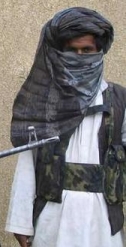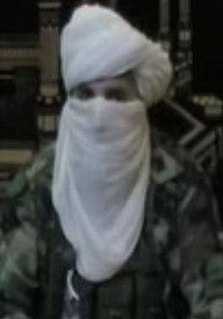
The Islamic Emirate of Afghanistan was an Islamic state established in September 1996 when the Taliban began their rule of Afghanistan after the fall of Kabul. At its peak, the Taliban established control over approximately 90% of the country, whereas remaining parts of the country in the northeast were held by the Northern Alliance, who maintained broad international recognition as a continuation of the Islamic State of Afghanistan. After 9/11, international opposition to the regime drastically increased, with diplomatic recognition from the United Arab Emirates and Pakistan being rescinded. The Islamic Emirate ceased to exist on December 17, 2001, after being overthrown by the Northern Alliance, which had been bolstered by a US-led invasion of the country.

Ahmed Wali Karzai was a politician in Afghanistan who served as Chairman of the Kandahar Provincial Council from 2005 until his death. He was the younger paternal half-brother of former Afghan President Hamid Karzai and an elder of the Popalzai tribe. Wali Karzai formerly lived in the United States where he managed a restaurant owned by his family. He returned to Afghanistan following the removal of the Taliban government in late 2001. He has been accused of political corruption and was allegedly on the CIA payroll. He was assassinated by one of his close bodyguards, Sardar Mohammad, on 12 July 2011.
Wakil Ahmad Muttawakil Abdul Ghaffar is a politician in Afghanistan. He was the last Foreign Minister in the Taliban government of the Islamic Emirate of Afghanistan. Prior to this, he served as spokesman and secretary to Mullah Mohammed Omar, leader of the Taliban. After the Northern Alliance, accompanied by U.S. and British forces, ousted the regime, Muttawakil surrendered in Kandahar to government troops.
Abdullah Mujahid is a citizen of Afghanistan who is still held in extrajudicial detention after being transferred from United States Guantanamo Bay detainment camps, in Cuba — to an Afghan prison.

Abdul Haq Wasiq is a citizen of Afghanistan who was held in extrajudicial detention in the Guantanamo Bay detainment camps, in Cuba. His Guantanamo Internment Serial Number was 4. American intelligence analysts estimate that he was born in 1971 in Ghazni Province, Afghanistan.

Maulavi or Mullah Dadullah or Dadullah Akhund was the Taliban's senior military commander until he was killed by British and American special forces in Afghanistan in 2007. He was an ethnic Pashtun from the Kakar tribe of Kandahar province. According to the United Nations' list of entities belonging to or associated with the Al-Qaida organization, he had been the Taliban's Minister of Construction.

Sirajuddin Haqqani is a military leader hailing from Afghanistan, who as deputy leader of the Taliban oversees armed combat against American and coalition forces, reportedly from a base within North Waziristan in Pakistan, from which he provides shelter to Al Qaeda operatives. Sirajuddin Haqqani is the leader of the Haqqani network, a sub-set of the Taliban organisation, and scion of the Haqqani clan. Haqqani is currently deputy leader under the Taliban supreme commander, Mawlawi Haibatullah Akhundzada.
Mullah Akhtar Mohammad Osmani or Usmani was a senior leader of the Taliban, treasurer for the organization, and close associate of Osama bin Laden and Mohammed Omar. He was involved in the demolition of the Buddhas of Bamyan and was considered a potential successor to Mullah Omar. Hamid Karzai, President of Afghanistan, once referred to him as one of the four most dangerous Taliban members still in Afghanistan.

Mullah Obaidullah, the Akhund was the Defence Minister under the Taliban government in Afghanistan and later became an insurgent commander during the Taliban insurgency against the new Afghan government and the US-led NATO forces. He was captured by Pakistani security forces in 2007 and died in 2010 of a heart disease inside a prison in Pakistan.
Abdul Qayyum "Zakir" is a citizen of Afghanistan previously held in the United States Guantanamo Bay detainment camps, in Cuba. His Guantanamo Internment Serial Number was 8. JTF-GTMO analysts estimate he was born in 1973, in Helmand, and grew up in northern Afghanistan.

Mullah Naqib Alikozai, sometimes called Naqibullah, was an Afghan mujahideen commander and politician from the Kandahar area of southern Afghanistan. He was the leader of the Alikozai Pashtun tribe.
Mullah Abdul Salaam Alizai is a former member of the Taliban movement who defected to the Afghan government in December 2007. He is a leader of the Alizai, a Pashtun tribe.
The Quetta Shura is a militant organization which is composed of the leaders of the Afghan Taliban, and believed to be based, since about 2001, within the city of Quetta in the Balochistan province of Pakistan. The Shura was formed at a time after the Islamic Emirate of Afghanistan was toppled as part of events occurring during late 2001, the senior leadership at the time, including Mullah Mohammed Omar, proceeding to escape into Pakistan. In February 2010, several of the key members of the Quetta Shura, who were dispersed within a variety of cities and towns of Pakistan, were detained by Pakistan's Inter-Services Intelligence (ISI). Pakistan proceeded to agree to repatriate these individuals to Afghanistan, if they were found to have not committed crimes within the boundaries of the Pakistani nation.

Mullah Hayatullah Khan is a Taliban leader and spokesmen. In 2004 Khan informed journalists that the Taliban's leadership were in Afghanistan, not taking sanctuary in Balochistan. When Hayatullah Khan made his first statement, in 2004, President of Afghanistan Hamid Karzai said "Who is this Taliban commander Hayatullah Khan who made this claim? I have never heard his name and probably you also don’t know him.".
MullahAbdul Ghani Baradar, also called Mullah Baradar Akhund or Mullah Brother, is a co-founder of the Taliban movement in Afghanistan. He was the deputy of Mullah Mohammed Omar. Baradar was captured in Pakistan by a team of Inter-Services Intelligence (ISI) and Central Intelligence Agency (CIA) officers in February 2010 and was released on 24 October 2018 at the request of the United States.
2003 in Afghanistan. A list of notable incidents in Afghanistan during 2003
The Mullah Dadullah Front, also known as the Dadullah Front, the Mullah Dadullah Lang Allegiance or the Mullah Dadullah Mahaz, is an insurgent group in Afghanistan that has claimed responsibility for a series of bombings and assassinations centered in Kabul.

Mullah Akhtar Mohammad Mansour was the leader of the Taliban, an Islamic fundamentalist political movement in Afghanistan, from 29 July 2015 to 21 May 2016.

Najibullah, often referred to as Mullah Najibullah or Hajji Najibullah, and also known by the pseudonym Omar Khitab, is the leader of the Taliban splinter group Fidai Mahaz in Afghanistan.













